Paradise Now
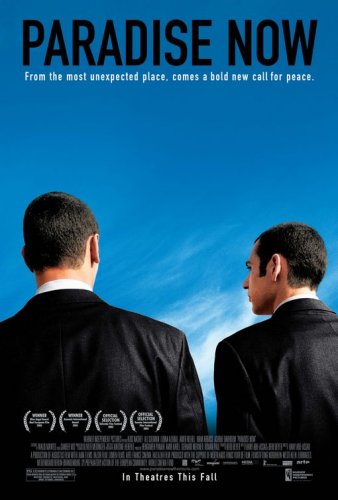 Rather
than being "a bold new call for peace," the first Palestinian film to
be Oscar-nominated is an emotional look at what could possibly
drive someone to become a suicide bomber.
Rather
than being "a bold new call for peace," the first Palestinian film to
be Oscar-nominated is an emotional look at what could possibly
drive someone to become a suicide bomber.
Paradise Now, like United 93, is a film that relies upon
the audience's prior knowledge of world events for context. This device
means that both films escape charges of didacticism, preferring to
present the "human face" of the struggle onboard one of the 9/11
planes, or of "the suicide bomber," as Paradise Now director,
Hany Abu-Assad, has put it.
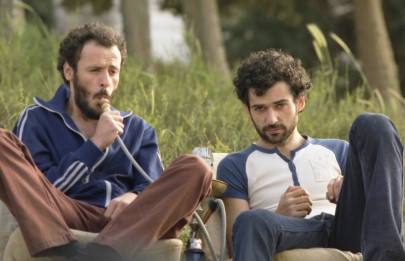
The approach of each of these films, both garnering instant attention because of their inflammatory subject matters, is to place the audience in the positions of the characters caught up in circumstances that are too big or complex to comprehend, and force the question, "what would you have done?"
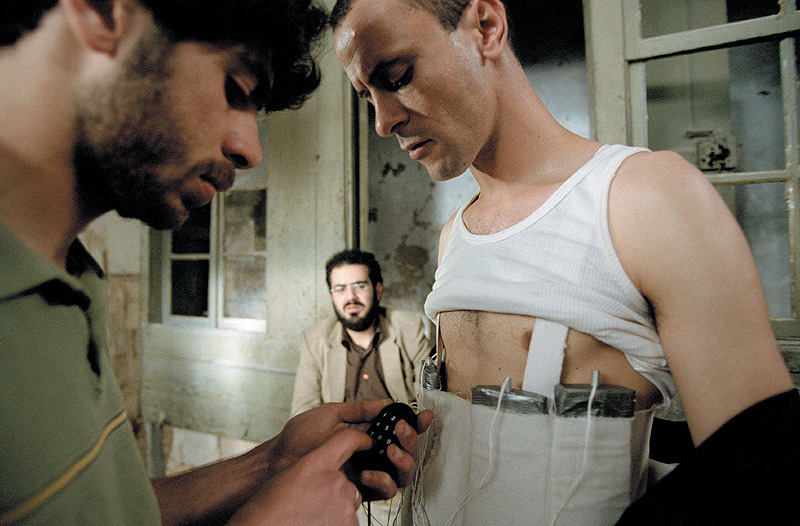 In Abu-Assad's vision, the West Bank is a land devoid of opportunity
for young men like protagonists Said (Kais Nashef)and Khaled (Ali
Suliman). The effects of Israeli occupation infuse every part of their
lives, from the stringent checkpoint searches for anyone who dares
enter or leave, to the cornershop stocking videos of martyrs on their
way to bombing themselves to paradise, to the grim experiences of Said
and Khaled's fathers at the hands of the enemy. In the middle of all
this, the main characters eke out unfulfilling lives fixing cars and
smoking a water pipe, while dreaming of change. Then, out of the blue,
they get the call-up from their comrades at an unnamed Palestinian
terrorist group, and are suddenly faced with their last 48 hours on
earth.
In Abu-Assad's vision, the West Bank is a land devoid of opportunity
for young men like protagonists Said (Kais Nashef)and Khaled (Ali
Suliman). The effects of Israeli occupation infuse every part of their
lives, from the stringent checkpoint searches for anyone who dares
enter or leave, to the cornershop stocking videos of martyrs on their
way to bombing themselves to paradise, to the grim experiences of Said
and Khaled's fathers at the hands of the enemy. In the middle of all
this, the main characters eke out unfulfilling lives fixing cars and
smoking a water pipe, while dreaming of change. Then, out of the blue,
they get the call-up from their comrades at an unnamed Palestinian
terrorist group, and are suddenly faced with their last 48 hours on
earth.
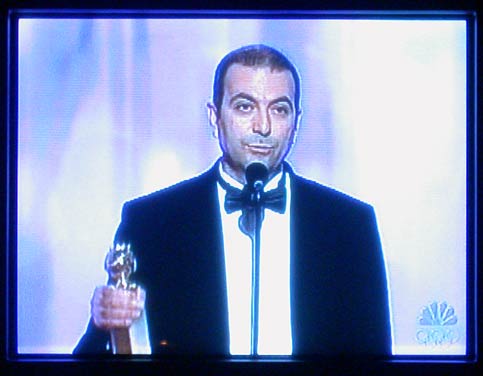 Some criticism has been levelled at the Nazareth-born, Holland-dwelling
director Abu-Assad (who co-wrote the script for the Golden
Globe-winning movie) for the portrayal of the main characters' motives.
Said and Khaled's reasons for turning to radical groups are pinned upon
personal reasons, rather than on any religious or politically
revolutionary zeal. However, these personal reasons are inextricably
linked to the political situation around them, and actually highlight
just how long the Palestinians have existed under occupation. Khaled
tells of how, as a younger man, Israeli soldiers broke into his
father's house and ask which leg he would prefer broken, crippling him
for life. Said's father suffered a much worse fate: he was executed as
a "collaborator;" the various implications behind this word are left up
to the audience to work out. Said was just ten years old when this
happened, and the incident (somewhat understandably) drives him. By
giving the characters backgrounds that the audience can find some
empathy with, Abu-Assad goes a long way towards humanising that
distant, terrifying monster, the suicide bomber.
Some criticism has been levelled at the Nazareth-born, Holland-dwelling
director Abu-Assad (who co-wrote the script for the Golden
Globe-winning movie) for the portrayal of the main characters' motives.
Said and Khaled's reasons for turning to radical groups are pinned upon
personal reasons, rather than on any religious or politically
revolutionary zeal. However, these personal reasons are inextricably
linked to the political situation around them, and actually highlight
just how long the Palestinians have existed under occupation. Khaled
tells of how, as a younger man, Israeli soldiers broke into his
father's house and ask which leg he would prefer broken, crippling him
for life. Said's father suffered a much worse fate: he was executed as
a "collaborator;" the various implications behind this word are left up
to the audience to work out. Said was just ten years old when this
happened, and the incident (somewhat understandably) drives him. By
giving the characters backgrounds that the audience can find some
empathy with, Abu-Assad goes a long way towards humanising that
distant, terrifying monster, the suicide bomber.
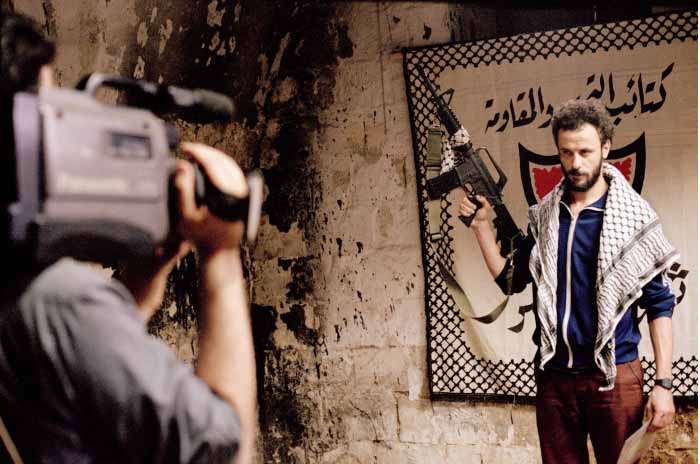
There are also flashes of humour that light up some of the darkest moments, emphasising the inherent absurdity of the situation. There is a running joke about the efforts of Said and Khaled's mothers to purify the unclean drinking water, highlighting the stoicism they have developed through living in poverty. In fact, halfway through his own martyr video, in which he bids farewell to the people he loves, Khaled drops into colloquial language again, to exhort his mother to change water filter brands. From the high-flown rhetoric of political challenge to the mundanities of everyday life: it again drives home the humanity and ordinariness of the concerns of these would-be killers. The filming of Khaled's suicide note is a farce in itself, as the crew sneak in sandwiches on the sly, the camcorder refuses to work and the repeated attempts at filming make the words lose all meaning. Where do these videos end up? After, perhaps, some fleeting glory on a news channel, they can be bought or rented at the local cornershop, although the owner informs Said that "collaborator" videos are much more popular than those of martyrs. So perhaps it will just end up gathering dust on a shelf, after all their efforts.
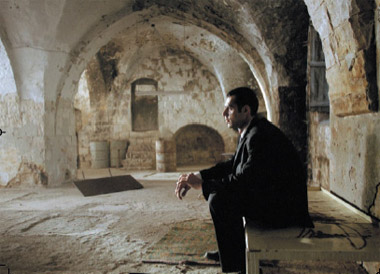
If there any straightforward 'baddies' to be found at all in this piece, they are the members of the terrorist group who prepare Said and Khaled - and other young lads like them - for a horrible/honourable death. While not demonised within the film, it is impossible not to condemn them for their manipulation of the impressionable young men that one, Jamal, has "known since their childhood." The unwillingness of the older men to get their own hands dirty for their 'cause' is seen best in the scene when the two almost-bombers ask what will happen next, meaning after death. Jamal answers, "two angels will pick you up." No one, least of all Jamal himself, seems taken in by the answer. This mission is not religiously-motivated; addtionally, the rewards of the afterlife, when spoken of, appear to be very hollow. Apart from Khaled and Said's own grievances, mainly relating to their fathers, their motives seem anchored to the many complexities of the situation they have grown up in; not something that can easily be shoehorned into a feature film. Admittedly, there will always be some margin of failure when seeking to understand someone who is prepared to take such extreme action. However, the power that the leaders of the terrorist group have over the main characters suggest yet another facet to their 'rise' to martyrdom: coercion.
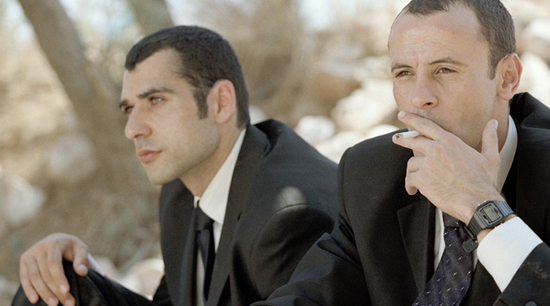 Paradise Now is a film that demands re-watching , as its twists
and turns, along with Said and Khaled's decisions, confound
expectations. It will only help us to understand the absolute
desperation of a would-be suicide bomber to a certain extent, but at
least the grey areas that it presents us with gives us the space to
make up our own minds. Above all, Paradise Now refuses to judge. It shows rather than tells. Watched in conjunction with United 93,
it gives us an intimate view of a closed world. Abu-Assad's
Palestine is a land where annihilation is preferable to continued
existence. Even if we can't ever truly understand how that would feel,
the film gives us the chance to see that no-one is born a
terrorist, but can be made into one by the demands of extreme and cruel
circumstance.
Paradise Now is a film that demands re-watching , as its twists
and turns, along with Said and Khaled's decisions, confound
expectations. It will only help us to understand the absolute
desperation of a would-be suicide bomber to a certain extent, but at
least the grey areas that it presents us with gives us the space to
make up our own minds. Above all, Paradise Now refuses to judge. It shows rather than tells. Watched in conjunction with United 93,
it gives us an intimate view of a closed world. Abu-Assad's
Palestine is a land where annihilation is preferable to continued
existence. Even if we can't ever truly understand how that would feel,
the film gives us the chance to see that no-one is born a
terrorist, but can be made into one by the demands of extreme and cruel
circumstance.
To contact the author:
See also on Netribution: Paradise Now - A Step Along the Road To Peace?
and Drop Oscar Bomber Film Israelis Plead